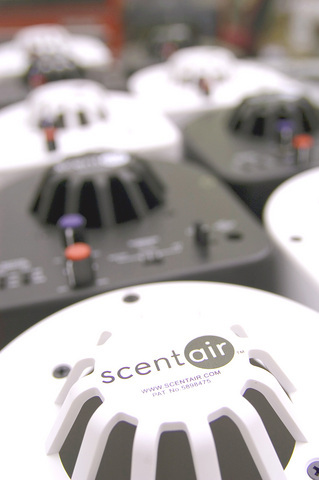From the soothing aroma of mom's apple pie to the reek of vomit or dinosaur dung, US marketers have sniffed out a new way to push their wares -- fragrance.
Real estate agents are using it to sell homes, retailers are using it to entice customers and the US military is using it for wargames.
"Any place that really cares about a customer's experience is looking into this," said David Van Epps, chief executive officer of ScentAir, one of several firms that design aromas for retail settings or special events.

PHOTO: AFP
"Of all the things that influence your mood and emotion and memory, fragrance is the powerhouse, more so than any of our other senses," he told reporters.
His company's clients include Sony, the Starwood Hotels chain that owns Westin and Sheraton hotels, Bloomingdale's department store, museums and US military contractors.
Sony sought out ScentAir last year for an aroma to woo female shoppers who may shy away from spending too much time at its electronics stores.
"We worked with them for six months and came up with a scent that has notes of mandarin origin, vanilla and cedar," Van Epps said. "It all blends together to create a very harmonious fragrance."
Sony now spritzes the scent at its stores nationwide and even in its shopping bags in the hope that customers will begin identifying the smell with the brand.
Van Epps said his company has so far catalogued nearly 1,500 aromas, including "dinosaur dung," which was created for a museum exhibit, "vomit," which was used by a theme park for a Halloween event and "open sewers," which is used in combat training to desensitize soldiers who may face unpleasant situations in combat.
ScentAir has also worked with the military to create the smell of airplane fuel, burning electrical wires and gunpowder for simulation training.
Real estate companies and home builders seek out soothing and welcoming scents such as vanilla, apple pie or chocolate chip cookies to create a homey atmosphere for prospective buyers.
"It's all about creating an experience that particular customers will remember," Van Epps said.
Custom blends cost between US$5,000 and US$25,000. Retailers are then usually charged US$100 a month for the small device that diffuses the aroma and for refills.
Van Epps said his company's scents have proven such a hit in the last two years that customers can now buy them off the rack.
Mary-Ellen Lapsansky, executive director of the New York-based Fragrance Foundation, said the market for environmental fragrance has really taken off in the last two years.
She said some companies, for example, pump peppermint scent into the workspace to energize employees. Vanilla scent has proven to be a soothing aroma and cherry scent, makes people happy.
"It has been proven scientifically that fragrance does have an effect on one's mood," Lapsansky said. "Stores that have used scent feel that consumers were inclined to linger longer in the aisles and therefore to purchase.

The CIA has a message for Chinese government officials worried about their place in Chinese President Xi Jinping’s (習近平) government: Come work with us. The agency released two Mandarin-language videos on social media on Thursday inviting disgruntled officials to contact the CIA. The recruitment videos posted on YouTube and X racked up more than 5 million views combined in their first day. The outreach comes as CIA Director John Ratcliffe has vowed to boost the agency’s use of intelligence from human sources and its focus on China, which has recently targeted US officials with its own espionage operations. The videos are “aimed at

STEADFAST FRIEND: The bills encourage increased Taiwan-US engagement and address China’s distortion of UN Resolution 2758 to isolate Taiwan internationally The Presidential Office yesterday thanked the US House of Representatives for unanimously passing two Taiwan-related bills highlighting its solid support for Taiwan’s democracy and global participation, and for deepening bilateral relations. One of the bills, the Taiwan Assurance Implementation Act, requires the US Department of State to periodically review its guidelines for engagement with Taiwan, and report to the US Congress on the guidelines and plans to lift self-imposed limitations on US-Taiwan engagement. The other bill is the Taiwan International Solidarity Act, which clarifies that UN Resolution 2758 does not address the issue of the representation of Taiwan or its people in

US Indo-Pacific Commander Admiral Samuel Paparo on Friday expressed concern over the rate at which China is diversifying its military exercises, the Financial Times (FT) reported on Saturday. “The rates of change on the depth and breadth of their exercises is the one non-linear effect that I’ve seen in the last year that wakes me up at night or keeps me up at night,” Paparo was quoted by FT as saying while attending the annual Sedona Forum at the McCain Institute in Arizona. Paparo also expressed concern over the speed with which China was expanding its military. While the US

SHIFT: Taiwan’s better-than-expected first-quarter GDP and signs of weakness in the US have driven global capital back to emerging markets, the central bank head said The central bank yesterday blamed market speculation for the steep rise in the local currency, and urged exporters and financial institutions to stay calm and stop panic sell-offs to avoid hurting their own profitability. The nation’s top monetary policymaker said that it would step in, if necessary, to maintain order and stability in the foreign exchange market. The remarks came as the NT dollar yesterday closed up NT$0.919 to NT$30.145 against the US dollar in Taipei trading, after rising as high as NT$29.59 in intraday trading. The local currency has surged 5.85 percent against the greenback over the past two sessions, central